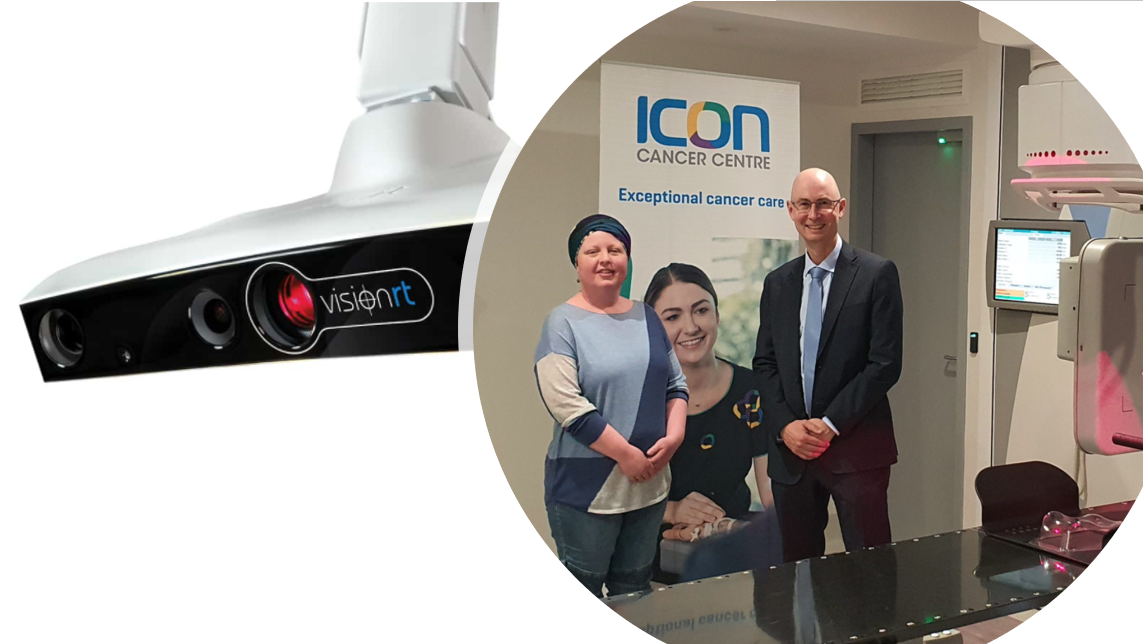News & Trends - MedTech & Diagnostics
Novel optical surface tracking technology for radiation therapy patients

MedTech News: Traditional radiation therapy for breast cancer requires patients to receive small but permanent chest tattoos, to assist clinicians in positioning them correctly for surgery so they are treated in the right location.
Kyra Fetherston was diagnosed with breast cancer at the age of 40 and has become the first person in South Australia to receive revolutionary new tattoo-free radiation treatment, at Icon Cancer Centre Windsor Gardens.
She underwent a course of surface-guided radiation therapy (SGRT) using the AlignRT system, which provides high doses of radiation directly to the cancer with pinpoint precision through an unlimited number of reference points.
“I was surprised when I learned I wouldn’t need to get permanent tattoos as part of my treatment. It meant there was one less thing for me to worry about, especially considering the pain and visibility involved with tattoos,” Mrs Fetherston said.
The cutting-edge technology uses safe, non-invasive light emitted from specialised camera units to track and monitor patients during set-up and treatment.
Icon Cancer Centre Radiation Oncologist Dr Scott Carruthers said the thousands of reference points it provides, rather than the usual three or four tattooed dots, allows treatment with millimetre accuracy.
“The AlignRT system also ensures the patient position remains precise when treatment is being delivered each day. This gives patients reassurance they are receiving highly-targeted treatment directly to the location of their cancer,” he added.
Radiotherapy has been shown to cause volume-dependent cardiac perfusion defects in 27% of patients within 6 months.
AlignRT is the only SGRT system with long-term data showing avoidance of cardiac damage in left-breast cancer patients.
Deep Inspiration Breath Hold (DIBH) monitors the patient’s breathing position throughout treatment without the need for invasive equipment.
Holding the breath for short intervals allows the heart to move further away from the radiation – and patients can see the process themselves during treatment.
“Knowing that radiation therapy can affect surrounding tissue, I was glad that using DIBH meant I didn’t complicate anything else, especially since I don’t have any existing issues with my heart or lungs,” Mrs Wetherston said.
Icon is Australia’s largest dedicated cancer care provider, and CEO Mark Middleton said the group aimed to push the boundaries of innovation.
“We are committed to reducing the burden of cancer in South Australia and across the country,” he said.
Icon’s Windsor Gardens clinic opened in 2018 and offers a wide range of services including chemotherapy and treatment for blood disorders. Patients do not need private health insurance to receive radiation therapy treatment, with up to 80-90% of costs reimbursed by Medicare.
News & Trends - Pharmaceuticals

Heart Week: Uniting patient and cardiologist voices in shaping a new future for patient outcomes
Coinciding with the start of the Heart Week (9 – 12 May), Professor Gemma Figtree, Interventional Cardiologist and Immediate Past […]
MoreNews & Trends - MedTech & Diagnostics

‘It’s a marathon not a sprint’: Industry leaders chart next steps in medtech’s sustainability journey
Ahead of World Environment Day in June, Jane Crowe, Managing Director of Cardinal Health Australia and New Zealand and Pravin […]
MoreNews & Trends - Pharmaceuticals

Vaccination accounts for almost half of mortality decline in infants
Pharma News: Researchers have mapped the impact of vaccines to mark the 50-year anniversary of the Expanded Programme on Immunisation […]
MoreNews & Trends - Pharmaceuticals

AbbVie, Pfizer and Bayer therapies to be considered at upcoming PBAC intracycle meeting
Pharma News: Therapies from AbbVie, Pfizer and Bayer are due to be considered at the Pharmaceutical Benefits Advisory Committee (PBAC) […]
More